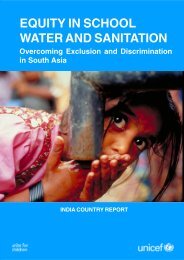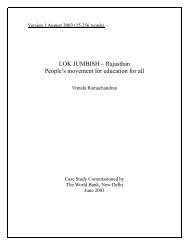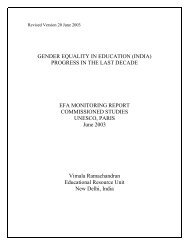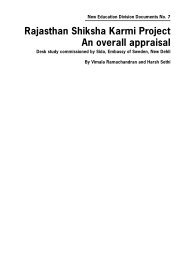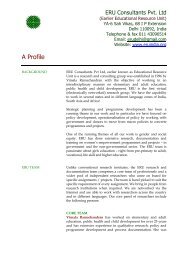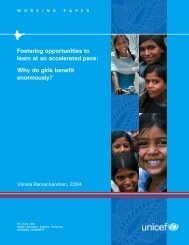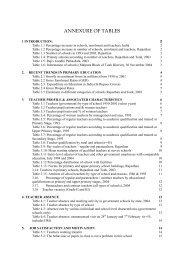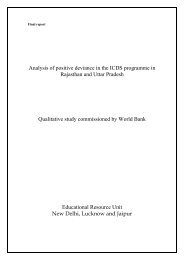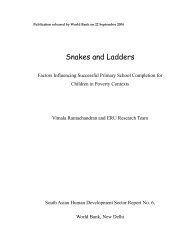primary school teachers the twists and turns of everyday practice
primary school teachers the twists and turns of everyday practice
primary school teachers the twists and turns of everyday practice
You also want an ePaper? Increase the reach of your titles
YUMPU automatically turns print PDFs into web optimized ePapers that Google loves.
Version 20 Oct 08, edited final<br />
Why are most <strong>teachers</strong> unable or unwilling to provide this leadership? The crux <strong>of</strong><br />
<strong>the</strong> problem lies with what <strong>the</strong> ‘system’ expects from <strong>the</strong> teacher. Let us revisit<br />
Malati’s story. When she joined <strong>the</strong> <strong>school</strong> she did not have any induction workshop,<br />
no one told her what she should do in class or what was expected <strong>of</strong> her. The few<br />
times when she did interact with her superiors, all <strong>the</strong>y wanted her to do was to fill<br />
out forms <strong>and</strong> to take <strong>the</strong> textbooks; later she was asked to do a household survey.<br />
When she wanted to know what she should do or how she should tackle a particular<br />
educational situation or problem, she had nobody to turn to. In this situation, Malati<br />
had no way <strong>of</strong> judging whe<strong>the</strong>r she was teaching well or whe<strong>the</strong>r she could help<br />
students learn more by doing things differently. Nor did she have any reason to even<br />
bo<strong>the</strong>r to think about it.<br />
Discussions with <strong>teachers</strong> in <strong>the</strong> five states we visited confirm Malati’s experience.<br />
Academic support institutions in Kerala, Maharashtra <strong>and</strong> Tamil Nadu (TN) were<br />
engaged in some degree <strong>of</strong> academic monitoring <strong>and</strong> support, although <strong>the</strong>se were<br />
for <strong>the</strong> most part designed to ensure <strong>teachers</strong>’ compliance with predefined tasks <strong>and</strong><br />
procedures, ra<strong>the</strong>r than to encourage <strong>the</strong>m to analyse <strong>the</strong>ir teaching <strong>practice</strong>s in <strong>the</strong><br />
light <strong>of</strong> <strong>the</strong>ir students’ learning outcomes. In Rajasthan <strong>and</strong> West Bengal, on <strong>the</strong><br />
o<strong>the</strong>r h<strong>and</strong>, <strong>the</strong> signals from <strong>the</strong> top were <strong>of</strong>ten contradictory <strong>and</strong> limited to<br />
administrative matters <strong>and</strong> data collection. Let us take a quick look at <strong>the</strong>se two<br />
states.<br />
In West Bengal, <strong>primary</strong> <strong>school</strong>s are ‘managed’ by a number <strong>of</strong> different bodies.<br />
Teachers are appointed at <strong>the</strong> district level but come under <strong>the</strong> administrative<br />
control <strong>of</strong> <strong>the</strong> West Bengal Board <strong>of</strong> Primary Education (WBBPE), <strong>the</strong>ir training <strong>and</strong><br />
supervision comes under <strong>the</strong> Directorate <strong>of</strong> School Education (DSE) <strong>and</strong> DI <strong>of</strong><br />
Schools, <strong>the</strong> funds are controlled by <strong>the</strong> DI <strong>of</strong> Schools. Under <strong>the</strong> Sarva Shiksha<br />
Abhiyan (SSA) fund flow, monitoring (data ga<strong>the</strong>ring) <strong>and</strong> training is h<strong>and</strong>led by <strong>the</strong><br />
SSA directorate <strong>and</strong> its district wing. The District Primary School Council (DPSC)<br />
<strong>and</strong> <strong>the</strong> panchayat do not speak in one voice: <strong>the</strong> DPSC is partly nominated <strong>and</strong> <strong>the</strong><br />
panchayat, an elected body, has no administrative role in <strong>school</strong>s.<br />
These various bodies were created at different points <strong>of</strong> time for specific reasons.<br />
According to <strong>the</strong> DPSC Chairperson we interviewed <strong>and</strong> <strong>the</strong> SSA coordinators at <strong>the</strong><br />
state <strong>and</strong> district levels, <strong>the</strong> existence <strong>of</strong> multiple chains <strong>of</strong> comm<strong>and</strong> essentially<br />
implies that <strong>the</strong> teacher is at <strong>the</strong> receiving end <strong>of</strong> instructions from all but effectively<br />
accountable to no one in particular. The ‘<strong>school</strong>’ also comes under different bodies<br />
<strong>and</strong> <strong>the</strong>refore <strong>the</strong>re is no coherent/coordinated body that takes care <strong>of</strong> all aspects <strong>of</strong><br />
<strong>school</strong>ing. No one can be held responsible for this sorry state <strong>of</strong> affairs <strong>and</strong> everyone<br />
passes <strong>the</strong> buck. Organisations like <strong>the</strong> Pratichi Trust working in <strong>the</strong> state say that as<br />
a result <strong>the</strong>re is no effective support or supervision <strong>and</strong> <strong>the</strong> <strong>school</strong>s are in a state <strong>of</strong><br />
decay.<br />
Said Kumar Rana <strong>of</strong> <strong>the</strong> Pratichi Trust: ‘…Pratichi Trust’s strategy is clear. We<br />
believe that <strong>teachers</strong> are a huge resource <strong>and</strong> <strong>the</strong>y can contribute a lot <strong>and</strong> only <strong>the</strong>y<br />
can break <strong>the</strong> cycle <strong>of</strong> poor quality <strong>and</strong> high drop out rates. We need to dem<strong>and</strong><br />
involvement <strong>of</strong> <strong>teachers</strong> in policy-making <strong>and</strong> in formulation <strong>of</strong> curriculum <strong>and</strong><br />
textbooks. Simultaneously we need to list what <strong>the</strong> <strong>teachers</strong> can do <strong>and</strong> what <strong>the</strong>y<br />
cannot do. This could be followed by a series <strong>of</strong> workshops on teaching methods,<br />
English <strong>and</strong> science teaching. We can see visible change in Bribhum <strong>and</strong> some work<br />
has also started in Malda, Jalpaiguri <strong>and</strong> Gopiballabganj’ (interview, July 2008). In<br />
13



